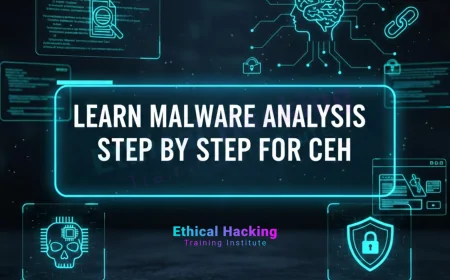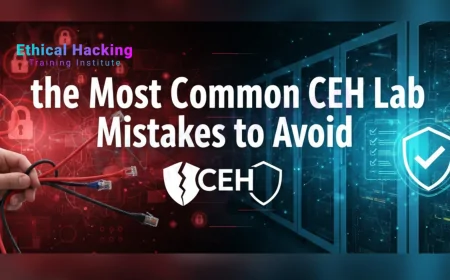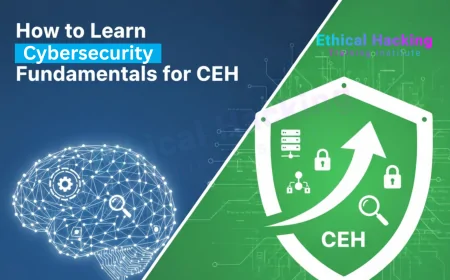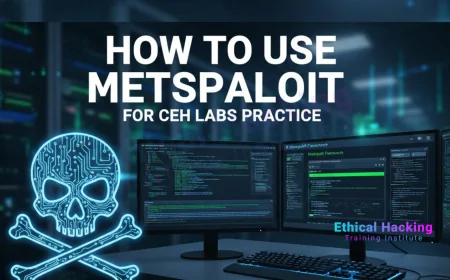EC Council Computer Hacking Forensic Investigator CHFI: The Ultimate Guide for Aspiring Experts | CHFI Career Blueprint: EC-Council’s Program for Cyber Forensics Specialists
Explore the ultimate guide to EC-Council CHFI certification. Learn about exam cost, syllabus, training options, tools, legal relevance, and career scope in digital forensics.
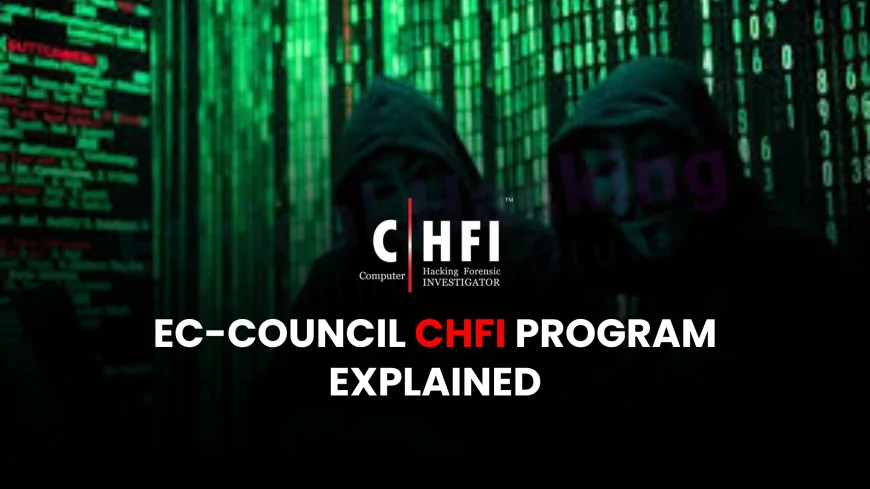
Table of Contents
- Introduction
- What is CHFI Certification?
- Why Choose CHFI?
- Who Should Pursue CHFI?
- CHFI Exam Structure & Format
- CHFI Exam Cost & Pricing
- Topics Covered in CHFI
- CHFI Training Options
- How to Prepare for CHFI Exam
- Self-Study Tips
- Tools and Labs Included
- Career Scope and Salary After CHFI
- Certification Renewal & Maintenance
- CHFI vs CEH vs ECSA
- Global Recognition and Demand
- Legal and Ethical Significance of CHFI
- Job Roles for CHFI Certified Professionals
- Organizations Supporting CHFI
- Frequently Asked Questions (FAQs)
- Conclusion
Introduction
The demand for cybersecurity professionals who can legally investigate cybercrime has grown exponentially. EC-Council’s Computer Hacking Forensic Investigator (CHFI) certification bridges the gap between cybersecurity and law enforcement by equipping professionals with the skills to conduct thorough digital investigations.
What is CHFI Certification?
CHFI stands for Certified Hacking Forensic Investigator, a globally recognized certification offered by EC-Council. It validates your ability to identify, collect, analyze, and preserve digital evidence, making it admissible in court. The certification combines legal knowledge with advanced forensics tools and methodologies.
Why Choose CHFI?
- Recognized by government, military, and Fortune 500 companies
- In-demand skill set for cybercrime investigation
- Focus on forensics, evidence handling, and legal frameworks
- High ROI for cybersecurity and IT professionals
Who Should Pursue CHFI?
This certification is perfect for:
- Law enforcement personnel
- Security officers and consultants
- System administrators and auditors
- Legal professionals in cybercrime
- Military and government employees
CHFI Exam Structure & Format
- Exam Code: 312-49
- Duration: 4 hours
- Number of Questions: 150
- Question Format: Multiple Choice
- Delivery: Pearson VUE (Test Center or Online Proctored)
CHFI Exam Cost & Pricing
| Item | Cost (USD) |
|---|---|
| Exam Voucher Only | $550 |
| iLearn (Self-paced) | $2,199 |
| Instructor-led Training | $2,499 – $3,499 |
| Retake Fee | $150 – $200 |
Topics Covered in CHFI
- Forensics methodology and tools
- Windows, Linux, and Mac forensics
- Steganography and anti-forensics
- Cloud, email, mobile, and IoT forensics
- Network traffic analysis
- Incident response and chain of custody
CHFI Training Options
- iLearn: Self-paced eLearning (videos + labs)
- iWeek: Instructor-led online training
- ATC: Authorized Training Centers worldwide
How to Prepare for CHFI Exam
- Enroll in EC-Council approved training
- Download the CHFI exam blueprint
- Set up a study plan (3–6 months recommended)
- Use official labs and practice tests
- Join CHFI communities and forums
Self-Study Tips
- Review each module with notes
- Use flashcards and cheat sheets
- Watch YouTube tutorials and webinars
- Attempt sample questions regularly
- Simulate forensic tasks using CyberQ labs
Tools and Labs Included
CHFI training includes hands-on labs with tools like:
- EnCase
- Autopsy
- FTK (Forensic Toolkit)
- Wireshark
- Sleuth Kit
- X-Ways Forensics
Career Scope and Salary After CHFI
- Job titles: Forensics Analyst, Cybercrime Investigator, Security Consultant
- Average salary: $80,000 – $120,000+ annually
- High demand in law enforcement, corporate security, and consulting
Certification Renewal & Maintenance
To renew your CHFI certification:
- Earn 120 EC-Council Continuing Education (ECE) credits every 3 years
- Pay renewal fee ($250 approx.)
- Submit proof of professional development activities
CHFI vs CEH vs ECSA
| Certification | Focus Area |
|---|---|
| CHFI | Digital Forensics & Incident Response |
| CEH | Ethical Hacking & Penetration Testing |
| ECSA | Advanced Security Assessments |
Global Recognition and Demand
CHFI is recognized across industries such as:
- Banking & Finance
- Defense & Military
- Healthcare
- Insurance & Risk Management
- Law Enforcement Agencies
Legal and Ethical Significance of CHFI
CHFI ensures that you understand the importance of evidence integrity, legal admissibility, and compliance with privacy and data protection laws such as GDPR and HIPAA.
Job Roles for CHFI Certified Professionals
- Forensic Computer Analyst
- Digital Evidence Specialist
- Cybersecurity Analyst
- IT Security Auditor
- eDiscovery Consultant
Organizations Supporting CHFI
Some companies and agencies that value CHFI include:
- Interpol
- FBI
- NSA
- Deloitte, PwC, KPMG
- Microsoft, IBM, Cisco
Frequently Asked Questions (FAQs)
1. What is the CHFI certification?
The CHFI (Computer Hacking Forensic Investigator) is a certification from EC-Council that validates your expertise in digital forensics, cybercrime investigation, and evidence analysis.
2. Who is eligible to take the CHFI exam?
You’re eligible if you either complete the official EC-Council training or have at least 2 years of proven work experience in information security or forensics and get approval via the eligibility process.
3. What is the cost of the CHFI certification?
The standalone exam voucher costs approximately $550, while training packages (with courseware and labs) range from $2,199 to $3,499, depending on the training mode.
4. Is CHFI training mandatory?
Training is mandatory unless you qualify for and are approved via EC-Council’s Exam Eligibility Waiver, which requires documented experience.
5. How long is the CHFI exam?
The CHFI exam is 4 hours long and consists of 150 multiple-choice questions covering forensics, cyber laws, and tools.
6. Where can I take the CHFI exam?
You can take the exam either online via remote proctoring or at any authorized Pearson VUE testing center.
7. What topics are covered in the CHFI syllabus?
Topics include: File system forensics Email analysis Network forensics Mobile and IoT forensics Malware investigations Cloud forensics Legal procedures and chain of custody
8. What tools are taught in CHFI training?
You’ll work with tools such as: FTK (Forensic Toolkit) EnCase Autopsy Wireshark Sleuth Kit X-Ways Forensics
9. What jobs can I get with a CHFI certification?
CHFI-certified professionals are qualified for roles like: Digital Forensic Analyst Incident Response Specialist Cybercrime Investigator Security Consultant IT Auditor
10. Is CHFI globally recognized?
Yes, CHFI is recognized by law enforcement, government agencies, and major corporations around the world, including the FBI, Interpol, and top cybersecurity firms.
11. How long does it take to prepare for the CHFI exam?
Most candidates take 3 to 6 months to fully prepare, depending on their prior knowledge, experience, and study schedule.
12. What is the passing score for CHFI?
The passing score varies between 60% and 85%, depending on the difficulty level of the exam version you receive.
13. Can I renew my CHFI certification?
Yes, CHFI is valid for 3 years. To renew, you need 120 ECE (EC-Council Continuing Education) credits and must pay a renewal fee.
14. Is there a retake fee if I fail the exam?
Yes, if you fail the exam, you can retake it by purchasing a retake voucher, which usually costs between $150 and $200.
15. What is the difference between CHFI and CEH?
CEH (Certified Ethical Hacker) focuses on offensive security and ethical hacking. CHFI focuses on digital forensic investigation and legal evidence handling.
16. Does CHFI include hands-on practice?
Yes, CHFI official training includes practical labs via EC-Council’s CyberQ platform, allowing real-time simulation of forensic scenarios.
17. Can beginners take the CHFI course?
While beginners can take CHFI, it is recommended to have a basic understanding of cybersecurity concepts or first complete CEH or a foundational security course.
18. What are ECE credits in CHFI?
ECE stands for EC-Council Continuing Education. You need to earn 120 credits every 3 years through training, conferences, writing, or teaching to maintain your certification.
19. Are there free resources for CHFI exam preparation?
Yes. Free CHFI resources include YouTube tutorials, cybersecurity blogs, sample questions, flashcards, and discussion forums. However, official courseware is paid.
20. What makes CHFI important for cybersecurity careers?
CHFI proves your ability to legally investigate cybercrimes, retrieve admissible digital evidence, and help prosecute offenders — skills that are crucial in law enforcement, government, and enterprise security roles.
Conclusion
The CHFI certification is a vital credential for any professional seeking to become a leader in cybercrime investigation. It empowers you with both the theoretical foundation and practical skills required to handle digital evidence responsibly and effectively. Whether you’re a law enforcement officer or a cybersecurity analyst, CHFI opens doors to advanced career opportunities and global recognition.
What's Your Reaction?
 Like
0
Like
0
 Dislike
0
Dislike
0
 Love
0
Love
0
 Funny
0
Funny
0
 Angry
0
Angry
0
 Sad
0
Sad
0
 Wow
0
Wow
0







